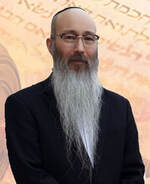|
By: HaRav Menashe Sasson Reporting from Jerusalem, Israel Published in the U.S.A. There are two roads to Geulah [גאולה] (Redemption): the short route and the long route; the easy way and the hard way. Parashat Ha’azinu ([האזינו] “listen”) contains the roadmap for the short route. Parasha Ha’azinu concludes with HaShem’s last command to Moshe Rabbeinu.
Debarim 32:48-50. One method of determining the meaning of a word in Tanakh is to look to other instances where the same word is used. Ideally, one should look to the first instance where the word is used in Tanakh. The Torah uses the phrase “selfsame day” [בעצם היום הזה] in two other places. One was when Noah, over the objections of the masses, entered the Ark, Bereshit 7:13; the other was when Moshe, over the objections of the Egyptians, took the Israelites out of Egypt. Shemot 12:51. When HaShem ordered Moshe to ascend Mount Nebo, it was over the objections of the Israelites, who believed they could prevent Moshe’s death by persuading Moshe to not ascend the mountain. According to Rashi, in each case, use of the phrase “selfsame day” [בעצם היום הזה] recounts an event where HaShem compelled an act “on the brightest part of the day, for all to see and over the objections of a large number of people,” to demonstrate that no one can thwart the will of HaShem. Rashi, on Debarim 32:48-50. In Parasha Beshallah, we learn that:
Shemot 17:8-13. We learn from Parasha Ha’azinu that man cannot thwart the will of HaShem. From Parasha Beshallah we learn that success against the enemies of the Jewish people requires both competent and determined military leadership and action, combined with prayer. Medinat Yisra’el – the State of Israel – was established in 1948, after World War II and the Holocaust. Immediately after coming into existence, Medinat Yisra’el was attacked by each and every of its neighboring, contiguous countries – all of which happen to be Arab. In a fashion similar to that of the Israelites, whose fight against the Amalekites is told in Parasha Beshallah, Medinat Yisra’el, with substantial and indispensable assistance from the Almighty, won its 1948 war for independence or, more accurately, it’s first war of survival. As a result, Medinat Yisra’el was able to establish sovereignty over a very small geographic area. During 1967, Medinat Yisra’el was again attacked by each and every of its contiguous Arab neighbors. Again, with substantial and indispensable assistance from the Almighty, Medinat Yisra’el prevailed. Not only did Medinat Yisra’el win the 1967 war, she managed to substantially expand her 1948 borders. Medinat Yisra’el’s post-1967 borders encompassed more of the Biblical areas of Eretz Yisra’el, including Har HaBayit (the Temple Mount), and Judea and Samaria. However, in direct contravention of the Torah, Medinat Yisra’el, since winning the 1967 war, has relinquished control of Har HaBayit to the Jordanians and has failed to exercise sovereignty over Judea and Samaria. We learn from the Torah, in Parashat Lekh-Lekha, that “HaShem said to Abram, ‘Go for yourself [לך-לך] from your land, from your relatives, and from your father’s house to the land that I will show you. And I will make you a great nation. . . .’” Bereshit 12:1-2. The commentator Maimonides (the Rambam) wrote:
Sefer HaMitzvot, Mitzvah 4. Thus, we see that HaShem gave Eretz Yisra’el to the Jewish people as an “inheritance” and that the Jewish people “for all time” and “even during the exile” are to reside in the Land. Implicit in this command is, of course, a prohibition against relinquishing Eretz Yisra’el, or any part thereof, to any non-Jew. From Parasha Ki Tissa, we learn that HaShem warned the Jewish people at Har Sinai, during the giving of the Torah, against entering into treaties which would allow those from whom the Land has been captured to remain in Eretz Yisra’el.
Shemot 34:11-17. In Parashat Mas’e, we learn that “HaShem spoke to Moshe in the plains of Moab, by the Yarden, near Yereho, saying, ‘Speak to the Children of Yisra’el and say to them: When you cross the Yarden [river and enter] into Eretz Kena’an, you shall drive out all of the inhabitants of the Land before you. . . .” Bamidbar 33:50-52. Likewise, in Parashat Shofetim, we are told that “But from the cities of these peoples that HaShem, you G-d gives you as an inheritance, you shall not allow any person to live. Rather, you shall utterly destroy them. . . .” Debarim 20:16-17. The Or HaHayyim wrote that:
Abarbanel, Commentary on Shemot 34:11-12. Just as the Torah promised, the Arab nations, in cooperation with each other, have collectively fought against Medinat Yisra’el, while the Arabs who live in Medinat Yisrael are today a “snare among” the Jewish people because the Jewish people have “seal[ed] a covenant with” them simply by allowing them to remain in Eretz Yisra’el. Considering the current state of affairs in Medinat Yisra’el, in the light of the lesson from Parasha Ha’azinu that man cannot thwart the will of HaShem; the lesson from Parasha Beshallah is that success against the enemies of the Jewish people requires both competent and determined military action and prayer. The lesson from Parasha Ki Tissa, the Or HaHayyim, and Abarbanel, is that treaties should not be made which would allow Arabs to remain in Eretz Yisra’el after their claim to the Land has been extinguished through military defeat. Unfortunately, it is abundantly clear that the current Jewish political leaders of Medinat Yisra’el have failed to apply the lessons of the Torah, including those of Parasha Ha’azinu and Parasha Beshallah. An obvious question is: “Why has the political leadership of Medinat Yisra’el not governed assertively, in accordance with the Torah, and in the best interests of the Jewish people? One answer, sadly, is fear and lack of “bitahon” [ביטחון] (trust in G-d). They fear Arab retaliation; they fear how the nations, including the United States, will react; and, perhaps most, they fear loss of their political power. If, however, they had “bitahon” [ביטחון], they would take to heart the Torah command that:
Debarim 20:1-4. There are at least two important messages in these pesukim. The first is that if the Jewish people have “bitahon” [ביטחון], and if they perform “hishtadlut” [השתדלות] (exertion of human effort), HaShem will go “with [the Jewish people], to fight for [the Jewish people] with [their] enemies, to save [the Jewish people].” The second is that the Jewish people should treat their enemies as enemies. The pesuk commands: “when you go out against your enemy” to emphasize that war is being fought against an enemy, not a friend. The Midrash teaches that the Jewish people should, “Go against them as enemies! Just as they do not have mercy upon you, do not have mercy on them.” Tanchuma, Shofetim 15. In other words, when fighting a war, the Jewish people should fight to win, should not show weakness, and should avoid taking half-measures in the mistaken belief that doing so is somehow compassionate, righteous, or effective. We know from the Talmud that Mashiach can come at one of two possible times: at either a fixed point in time or earlier, if the Jewish people merit redemption. Masechet Sanhedrin 97a-b. May the Jewish people, especially its Jewish political leaders in Medinat Yisra’el, do complete Teshuvah [תשובה] (repentance), have “bitahon” [ביטחון] (trust in G-d), and perform “hishtadlut” [השתדלות] (exertion of human effort) in order to get Medinat Yisra’el on the right path and to merit immediate Geulah [גאולה] (redemption). שבת שלום Shabbat Shalom! Copyright © The Israel Foundation. All Rights Reserved.
0 Comments
Your comment will be posted after it is approved.
Leave a Reply. |
THE ISRAEL FOUNDATION





